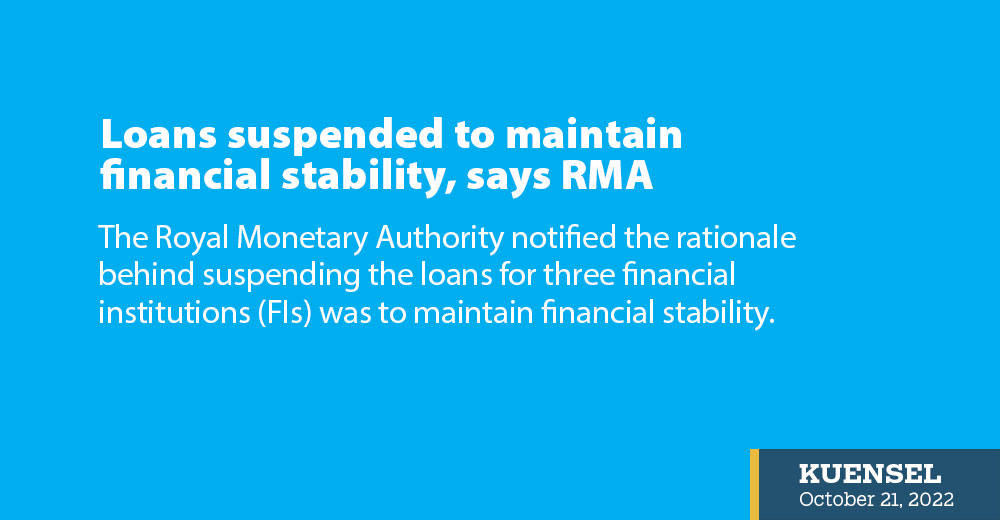Thukten Zangpo
The Royal Monetary Authority notified the rationale behind suspending the loans for three financial institutions (FIs) was to maintain financial stability.
The contractors and members from the private sector said that the government should intervene and lift the suspensions. However, Prime Minister Dr Lotay Tshering recently said that the government has no authority to act on the suspension. The most it could do was to write to the RMA. The finance minister wrote three times to the authority to reconsider its decision.
On May 13, Bhutan Development Bank Limited (BDBL), Royal Insurance Corporation of Bhutan Limited (RICBL) and National Cottage and Small Industry Development Bank (NCSIDB) stopped sanctioning new loans including bank guarantees because of high non-performing loans (NPLs).
The NPLs are loan repayment obligations overdue by more than 90 days.
The central bank’s threshold for NPL ratio for the BDBL and RICBL is 7.5 percent. For NCSIDB, the threshold is 5 percent. NPL ratio is the value of non-performing loans to the total value of the loan portfolio.
BDBL’s NPL ratio was 9.2 percent as of September 30. The bank has to maintain the NPL threshold to 7.5 percent by the end of 2022 and 5 percent by 2023. For new loans, the NPL ratio should be at 3 percent by 2023.
Similarly, the NCSIDB’s NPL ratio of 11 percent in March saw an improvement to 9 percent in June.
Uncovering several lapses, non-compliance and several weaknesses in the governance process of the three FIs, the authority found an excessive and risky proliferation of NPLs beyond the prudent levels set by the authority.
The FIs have not maintained proper credit appraisal system and accurate loan assessment.
However, the authority stated that subsequent corrective actions prescribed have not been complied with fully, were incorrectly addressed or were overly delayed by the FIs.
To resolve NPLs, the central bank had come up with three regulations aimed to support and rehabilitate viable NPL through loan restructuring measures while resolving non-viable loans through various foreclosure means such as court or out-of-court settlements.
The central bank stated that the FIs had failed to meet the requisite standards issued by the authority as in the past practices and the FIs continue to flout the strict rules and guidelines that are prescribed for the overall soundness of the financial system in the country.
“Left unchecked, an excessive level of NPLs would have a detrimental effect on the local banking system (including risking public saving deposits), and worse, lead to a collapse of Bhutan’s economy, thus severe undermining of Bhutan’s standing in the regional and global financial markets,” the notification stated.
The FIs have submitted the remedial actions to resolve NPLs as asked by the authority.
In an earlier interview, the chief executive officer of NCSIDB, Kinzang said that the cash repayment the bank receives from people has improved. “The repayment of Nu 30 million (M) in March improved to Nu 50M in June. “We are trying to bring down the NPLs.”
He added that the bank also follows pre-emptive measures by calling and reminding people of their equated monthly instalments.
The notification stated that the authority has a dual role as a regulator to set rules and guidelines, and other as a supervisor, to examine and regulate FIs to ensure compliance with laws and regulations through prudent and effective enforcement of all laws, regulations, rules and guidelines.
It is the responsibility of the FIs to urgently address the deficiencies in their banking and lending practices, and to demonstrate the FIs have reduced the levels of NPLs, it added.
Sharing concerns about reduced credit availability to the local and rural communities, the authority stated that there are other alternative lenders that have mandates to provide financial services.


